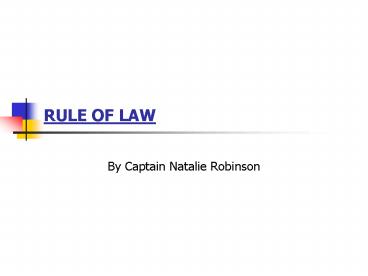RULE OF LAW - PowerPoint PPT Presentation
1 / 19
Title:
RULE OF LAW
Description:
Short Course all speak good enough english to understand? ... and others V Canary Wharf (1995) erection of Canary Wharf said to interfere with TV reception. ... – PowerPoint PPT presentation
Number of Views:46
Avg rating:3.0/5.0
Title: RULE OF LAW
1
RULE OF LAW
- By Captain Natalie Robinson
2
Initial Matters
- Short Course all speak good enough english to
understand? - Who requires assistance?
- Words or phrases you did not understand last week?
3
- COMMON LAW
- 1066
- William the Conqueror created Curia Regis (Kings
Court) - Judges travelled to major towns
- Local customs and Anglo-Saxon laws
- Decisions then became common law
4
JUDICIAL PRECEDENT
- Case law, past decisions create law
- Doctrine of Precedent
- stand by what has been decided and do not
unsettle the established - Ratio Decidendi
- Obiter Dicta
- Judgements provided by one or more judges
- Often reasons by each judge given if difficult
area of law
5
- Original precedent legal point never decided
before - Hunter and others V Canary Wharf (1995)
erection of Canary Wharf said to interfere with
TV reception. Question was was it actionable as
a nuisance? - Binding Precendent past decisions must be
followed
6
- Persuasive Precedent not binding but can be
followed - R v R (1987) House of Lords agreed with Court
of Appeal that a husband can be guilty of raping
his wife
7
HIERARCHY OF THE COURTS
- Every court must follow a decision made by a
higher court - As a general rule, all are bound to follow their
own past decisions - Appellate Courts
- 1) European Court of Justice
- Affects UK since 1973
- House of Lords may still be the supreme court
8
- 2) House of Lords
- Senior National court
- 3) Court of Appeal
- Civil and criminal matters
- Can depart from past decisions if liberty at risk
- 4) Divisional Courts
- 3 divisions Queens Bench, Chancery, Family
9
- 5) High Court
- Colchester Estates (Cardiff) V Carlton Industries
plc (1984) where 2 decisions conflict - 6) Inferior Courts
- Crown court, county court, magistrates court
10
HOUSE OF LORDS
- 1898 1966 felt it was bound by all past
decisions unless there had been an error - Anything unsatisfactory required an Act of
Parliament to rectify - DPP V Smith (1961) murder was contrary to
common law. Held could be guilty if a
reasonable man would have foreseen death or very
serious injury - Criminal Justice Act 1967 to be guilty had to
intend to cause death or serious injury
11
- 1966 Practice Statement use of precedent is
indispensable to the foundation to decide what is
law and apply it to individual cases - New decisions create case law
- R V R and G (2003) overruled the case of
Caldwell (1982) question of recklessness.
Earlier objective test, amended to subjective
12
COURT OF APPEAL
- S.2(1)(a) Human Rights Act 1998
- Only depart from past decisions if they were
careless or a mistake - Williams V Fawcett (1986)
- In criminal devision can depart where the
decision involves someones liberty
13
TYPES OF PRECEDENT
- 1) Distinguishing
- Material facts are different
- Balfour V Balfour (1919) and Merritt v Merritt
(1971) - First case did not involve an intention to create
legal relations, second did
14
- 2) Overruling
- Earlier decisions is wrong
- Pepper V Hart (1993) and Davis V Johnson (1979)
consultation of Hansard - 3) Reversing
- Overturning a decision of a lower court on appeal
15
- Judicial Law Making
- Involves many areas eg, negligence Donoghue V
Stevenson (1932) neighbour test - you must take reasonable care to avoid
acts/omissions which you can reasonably foresee
would be likely to injury your neighbour - Criminal divison - murder
16
- Effect of Acts of Parliament
- Previous precedents cease to apply
- Comparison with other legal systems
- Code of law, judge merely interprets
- USA, can rule differently
- Prospective overruling
17
- Advantages
- Certainty
- Consistency
- Precision
- Flexibility
- time
18
- Disadvantages
- Rigidity
- Complexity
- Illogical distinctions
- Slowness of growth
19
- Law Reporting
- Since 13th century
- Widely inaccurate until 1865, Incorporated
Council of Law Reporting - internet































